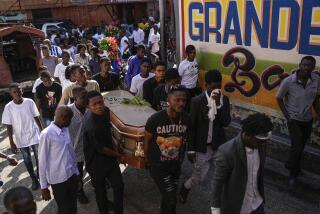Funeral Unleashes Day of Rage Over Apartheid : South Africa: Four blacks killed by police are buried. The people of Sebokeng township want justice--and revenge.
- Share via
SEBOKENG, South Africa — Gazing over the caskets of four blacks slain by police, the old revolutionary Walter Sisulu faced the yawning gap here Sunday between the world’s high expectations for peace in South Africa and the bitter reality of apartheid evident in the eyes of a mourning township.
“Stop Killing Our People,” demanded a hand-lettered sign above the 20,000 who turned out on Palm Sunday for a funeral in a dilapidated soccer stadium.
“There is no longer any room for anyone to be neutral,” said Sisulu, 77-year-old leader of the African National Congress’ internal wing. “You’re either with the (Pretoria) regime or you’re with us. I call for you to follow the road traveled by the people we are burying today.”
The depth of frustration with 42 years of apartheid, and the wariness about negotiating peace with a white government, is nowhere more evident than in this impoverished township, where a clash with police two weeks ago today briefly derailed the country’s peace process.
The people of Sebokeng have buried dozens of victims of police bullets over the years. The township, part of a constellation of ghettos known as the Vaal Triangle, 25 miles south of Johannesburg, was the birthplace of countrywide racial violence in 1984.
Their frustration bubbled over again March 26, when tens of thousands of blacks set out to protest living conditions. Police opened fire--without warning, witnesses said--and at least five people died on the spot, with more than 10 others killed later that day.
The ANC suspended its planned talks with the government, demanding the government take some action against the police officers in Sebokeng.
The talks, intended to discuss obstacles to negotiations, were back on track Thursday night when President Frederik W. de Klerk promised an in-depth investigation and perhaps a judicial inquiry into the police actions. Nelson R. Mandela flew to ANC headquarters in Lusaka, Zambia, on Sunday to plan strategy for the May 2-4 talks.
But the mood in Sebokeng was anything but conciliatory on this Sunday, with the wooden coffins of four more martyrs gleaming in the autumn sun.
“Things will never change,” said Paulos Malakoane Khenene, 18, a survivor of the latest violence whose arm and leg bore the white scars of police shotgun pellets. “Even if our people try to negotiate with De Klerk, his police will still harass us here.”
Benhamin Hlanynae, a local leader of the ANC-aligned Mass Democratic Movement, said that “people are still saying it’s too early to talk with the government.”
“We want to know who gave the order” to shoot, the Rev. Frank Chikane, secretary general of the South African Council of Churches, said from the pulpit. “We demand it from the government.”
Jay Naidoo, general secretary of the Congress of Trade Unions of South Africa, spoke of revenge.
“When freedom comes, we will have our own trials where the murderers (police officers) will be held to account,” he said to loud applause.
White South Africa is only now beginning to grasp the intensity of black anger in the country, Mandela said recently.
“If one white--just one--were killed by the police in the course of a demonstration, there would be a hue and cry by whites all over the country,” Mandela said. “But whites are so used to the police killing blacks that it is regarded now as a daily occurrence.”
It took the ANC’s firm stand, Sisulu said Sunday, “to make the authorities realize how grave the situation is.”
As Sisulu’s words echoed across the township, throngs of mourners in the green, black and gold colors of the ANC marched up the long hill to the cemetery to again bury their dead.
More to Read
Sign up for Essential California
The most important California stories and recommendations in your inbox every morning.
You may occasionally receive promotional content from the Los Angeles Times.














